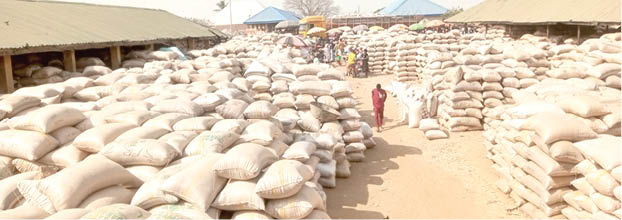Imports from Chad, Ghana, others crash grains prices in Niger markets
The grain market in Niger State is witnessing a sharp decline in prices due to a surge of imports from neighbouring countries like Chad, Ghana, Benin Republic and Burkina Faso. This influx has created a surplus that is significantly affecting local traders, suppliers and farmers. Grain hoarders now face the threat of substantial financial losses […]

17weeklypage31
The grain market in Niger State is witnessing a sharp decline in prices due to a surge of imports from neighbouring countries like Chad, Ghana, Benin Republic and Burkina Faso.
This influx has created a surplus that is significantly affecting local traders, suppliers and farmers. Grain hoarders now face the threat of substantial financial losses because their stores and market places are filled up with bags of assorted grains with no buying taking place.
Grain farmers and suppliers told Weekend Trust that the steady flow of imported grains has disrupted the market, leaving local players grappling with reduced profits as prices of key staples such as soybeans, beans, maize, millet and sorghum continue to tumble.
The drop in prices is partly attributed to companies—especially animal feed producers in Nigeria—turning to buy from the neighbouring countries especially Chad, Ghana, Burkina Faso and Benin Republic due to lower costs. Favourable harvests in those countries have made it possible for their farmers to supply enough to Nigerian companies at lower cost.
- Yobe, Bauchi communities make fortunes from cassava flour
- FG to support 400,000 farmers for dry season
A trader in Minna lamented the situation, saying, “We anticipated a price hike and stocked up on grains to sell at a profit later, but the sudden influx of imported grains has made it difficult to offload our stock without incurring losses.”
Hoarders, who typically rely on market volatility to maximise profits now live in fear due to this unexpected market shift. Some commentators told our correspondent that with the market flooded, there was little room for speculation, saying that if the current trend continues, many traders with intent to hoard grains for future profits will face significant losses.
Meanwhile, consumers are happy with the crash in prices, saying that the crash will ease household expenses. However, local farmers argue that the crash in prices threatens their livelihoods.
Hassan Ango Abdullahi, Chairman of the Amana Farmers and Grains Suppliers of Nigeria, Shiroro LGA branch, confirmed the trend during an interview with our correspondent at Gwada Market.
“Companies now prefer buying from Chad, Ghana and other countries because the prices there are cheaper. For example, we bought beans and soybeans at N103,000 and N105,000 per 100kg bag when they first came out, but now the price has dropped to N80,000. Those who stocked grains at higher prices hoping for a profit are now struggling,” he said.
He added, “Last year, companies were rushing to buy maize from us, and we couldn’t meet their demands. This year, they have completely stopped buying from us because it’s cheaper for them to buy from neighbouring countries. We have bags of maize piled up in our stores with no buyers.”
Abdullahi called on the federal and state governments to support farmers by providing subsidized inputs such as fertilizers, chemicals and tractors to boost productivity, highlighting that “If the government genuinely empowers farmers, grain prices will continue to drop, making food affordable for everyone,” he said.
He also urged the Niger State government to decentralize fertilizer sales points, ensuring accessibility for rural farmers. “It’s unreasonable to expect farmers in remote areas to travel to Minna to buy fertilizers. Each ward should have its own sales point,” pointing out that delays in the distribution of inputs also contribute to high production costs.
However, not everyone agrees that the price crash is a problem. Sani Usman, Secretary of the Amana Farmers and Grain Suppliers Association, Shiroro LGA, argued. He said that “Farmers are not recording losses. Even with fertilizer at N40,000 per bag, maize is selling at N52,000, and soybeans at N80,000. Compared to last year, when maize sold at N30,000 per bag, farmers are in a better position this year.”
Despite this, some farmers insist that the falling prices are unsustainable. Abubakar Baba, a farmer, expressed concern, saying, “We bought inputs at high costs, and now we’re being asked to sell at lower prices. We can’t recover our investments under these conditions. The government has failed to support us.”
On the consumer side, Maryam Bilya, a shopper at Gwada Market, expressed gratitude for the declining prices but noted that rice remains unaffordable for many households. “A measure of rice still costs N2,400, which is beyond the reach of many citizens,” she said, echoing the need for further price reductions in staple grains like millet and sorghum.
Checks at some rural markets in the state showed that the prices of assorted grains especially maize, sorghum, millet, beans and soybeans have remained stagnant since October 2024.
At Zungeru, Beji, Kakakpangi, Lapai, Manigi, Lemu and Wuya markets, all in Niger State, the prices of grains have not moved up as anticipated by traders and farmers, though some analysts have anticipated the forthcoming Ramadan to ignite the possible rise in the prices.
The situation highlights the delicate balance required in crafting agricultural policies that protect farmers while ensuring affordable food for consumers. Analysts said without targeted interventions, the ripple effects of this price crash could reshape Niger State’s agricultural sector and its stakeholders.
